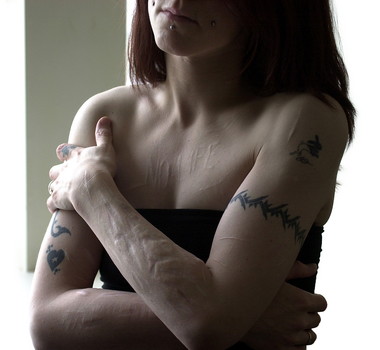Self mutilation also known as Self cutting, self-harm, self-injury, self-abuse and self inflicted violence. It is the deliberate harming of one’s body without the intent to commit suicide. It is an act of physical violence done to yourself by yourself. People who injure themselves usually hide the cuts and marks and sometimes no one else knows
Many different people across the world no matter what age sometimes need to cut themselves, or inflict pain onto themselves in order for them to feel better. This happens for many different reasons; some of the reasons that make people feel that harming themselves is the only way to make them feel better are:
-A Cry for Help
Some people cut themselves to show others they need help in life. They need to find something or someone that can give them a reason for why they should be here.
-Cutting is a Disorder
People that suffer from different forms of depression, cut after reaching a peak in sorrow. This is very reasonable. Seeing them bleed reminds them that they are still able to feel something, and that life isn’t over yet.
– For Attention
Teens or other people cut themselves in hope for attention. In hope that someone will care that they do it. These people are usually the ones that go off and tell everyone that they do it, just so they’ll feel bad for them.
– It puts them in control
Some people cut in order to see that they are in control of something. Seeing the blood and feeling the pain shows them they can control at least one thing, which is good positive reinforcement
-Cutting relieves stress
when someone cuts themselves; pain relieving chemicals called Endorphins are released to relieve stress or emotional pain.
Self-mutilation symptoms include:
*Scars, such as from burns or cuts
*Fresh cuts, scratches or other wounds
*Bruises
*Hair loss or bald spots
*Broken bones
*Keeping sharp objects on hand
*Spending a great deal of time alone
*Wearing long sleeves or long pants even in hot weather
*Claiming to have frequent accidents or mishaps
Warning Signs
Young People who self-injure become very adept at hiding scars or explaining them away. Because young people who self-injure often do not know how to ask for help, it is important to watch for some of these signs that a teen may be harming him or her:
*Unexplained injuries such as cuts, scratches, burns, bruises.
*Making excuses for injuries or scars if they are discovered
*Acting embarrassed or ashamed about injuries
*Wearing concealing clothing (e.g. long sleeves even in hot weather)
*Secretiveness or withdrawal
*Having trouble dealing with emotions
*Spending time with people who self-injure, especially on the internet
* Eating disorders
*Having trouble functioning at work, school, and in relationships
*Low self esteem
Getting help
Self-injury can become very serious and sometimes addictive. The underlying cause of their stress needs to be addressed to stop the behaviour. Here are some tips for parents of teens:
*Teach your teen positive coping mechanisms and problem solving skills. By encouraging you’re teen to find positive activities to relax or deal with emotions, such as exercise, playing an instrument, journal writing, sports, dancing, reading, etc.
*Talk to your teen calmly and directly. Do not lecture, judge, or get angry.
*Do not force your teen to stop; he or she needs to make that change on his or her own.
*Be supportive by listening and letting your teen know that he or she is not a bad person and can find better ways to deal with his or her emotions. Encourage your teen to talk their problems out with you, other responsible adults, or friends.
*Seek help from a doctor or counsellor who is comfortable helping your teen work through the healing process. The help of a mental health professional might be needed for major life troubles or overwhelming emotions. Therapists and counsellors are trained to help people discover inner strengths that help them heal. These inner strengths can then be used to cope with life’s other problems in a healthy way.
*Encourage your teen to avoid people, music, and internet sites that glorify self-injury, and to seek friends who share his or her positive interests.










